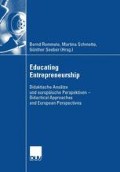Abstract
Entrepreneurship is considered an essential engine for economic growth. Several arguments support this axiom: the strengthening of the innovative capacity of the economy, more flexibility on the market, growing efficiency in organisations and the creation of jobs. As a result entrepreneurship can be found on the agenda of about every policy-making organisation at the local, national and international level.
Access this chapter
Tax calculation will be finalised at checkout
Purchases are for personal use only
Preview
Unable to display preview. Download preview PDF.
Bliography
Agoria Vlaanderen (2006): Skills for the future: Competentieagenda 2015. Brussel.
Alken, C.R.; Keller, S.P. (2006): The CEO’s role in leading transformation. In Voices on Transformation (2), 19–25.
Arenius, P.; De Clercq, D. (2004): A network-based approach on opportunity recognition. In Vlerick Leuven Gent Working Papers Series 2004/23.
Bakker, J.; De Jong, S. (2006): Leren is ondernemen — Draagvlak voor een vignet Leren Ondernemen? — Groningen.
Beardley, S.C.; Johnson, B.C.; Manyka, J.M. (2006): Competitive advantage from better interactions. In the McKinsey Quarterly 2006/2, p.53–63.
Bos, W. (2006): Ondernemerschap, wedijver en samenwerking. Eindhoven.
Bowen, H.P. (2005): National Institutions and the allocation of entrepreneurial effort. In Vlerick Leuven Gent Working Papers Series 2005/15.
Bowen, H.P.; Moesen W.; Sleuwaegen L. (2006): A composite index of the creative economy — Leuven.
Bouckenbooghe, D.; Van Den Broeck, H.; Cools, E.; Vanderheyden, K. (2005): In search for the Heffalump: An exploration of the cognitive style profiles among entrepreneurs. Gent.
Christensen, C.M. (2005): The innovator’s dilemma. New York.
Courtney, H.G. (1997): Games managers should play — In the McKinsey Quarterly 3/1997, 91–96.
Courtney, H.G. (2001): Making the most of uncertainty. In the McKinsey Quarterly 4/2001, 38–47.
De Crom, S.; De Witte, F. (2004): De zoektocht naar sterke starters — In Over-Werk 4/2004, 15–20.
De Voldere, I.; Janssens, E.; Onkelinx, J.; Sleuwaegen, L. (2006): The Creative Economy: Challenges and opportunities for the DC regions. Leuven.
Debruyn, M.; Schoovaerts, M. (2006): Innovation outside the lab: Strategic innovation as the alternative. Leuven.
Declercq, F. (2006): De impact van coaching op de prestaties van jonge ondernemingen. Antwerpen.
Devos, G.; Van De Woestyne, M.; Van den Broeck H. (2007): Het innovatieproces in grote bedrijven en KMO’s. Leuven.
Egberts, M. E.; Verheul, A. D.; Fisscher, O. A. M. (1993), De manager als coach. Deventer.
Europese Commissie (2003): De openbare raadpleging naar aanleiding van het groenboek “Ondernemerschap in Europa”. Brussel.
Europese Commissie (2003): Groenboek Ondernemerschap in Europa. Brussel.
Europese Commissie (2004): Eindverslag van de deskundigengroep “Onderwijs in Ondernemerschap” — Bevordering van ondernemersattitudes en —vaardigheden in het lager en middelbaar onderwijs: stand van zaken. Brussel.
Florida, R. (2002): The rise of the creative class: and how its transforming work, leisure, community and everyday life. New York.
Goossens, H; Verrue, J. (2004): Instrumenten voor de screening van studenten hoger onderwijs en de observatie van de leeromgeving. Leuven.
Jacobs, D. (2005): Creativiteit en de economie. Groningen.
Jade (2006): Entrepreneurial Spirit 2005. Brussel.
Johnson, B.C.; Manyka, J.M.; Yee, L.A. (2005): The next revolution in interactions. In The McKinsey Quarterly 4/2005, 21–33.
Johnson, K.L.; Danis, W.M.; Dollinger, M.J. (2004): Are innovators better Entrepreneurs? An examination of the relationship between cognitive style and entrepreneurship. In Clemson/Kauffman Symposium.
Kao, J.; Stevenson, H. (1984): Entrepreneurship what it is and how to teach it. Harvard.
Kirton M.J. (1989): Adaptors and innovators: Styles of creativity and problem solving. New York.
Obe, A.G. (2002): Towards the Entrepreneurial University — Entrepreneurship education as a lever for change. Birmingham.
Nardon, L. (2006): the role of culture in coping with uncertainty — In: Vlerick Leuven Gent Working Papers Series 2006/37.
National Dialogue on Entrepreneurship — The Public Forum Institute (Retrieved February 2007) http://www.publicforuminsititute.org/nde/entre/index.htm
Parys, L. (2007): Innovatie is een teamsport (Retrieved March 2007) http://www.flandersdc.be//content/view/91/101/lang,nl/.
Rutten, P.; IJdens, T.; Jacobs D.; Koch, K. (2005): Knelpunten in creatieve productie: creatieve industrie. Delft.
Schuurhuyzen, S. (2005): Van creativiteit naar goede prestaties: Een onderzoek naar de rol van creativiteit bij het ondernemerschap van theaters. Tilburg.
Stichting Kenniscentrum Handel (2004): Beroepscompetentieprofiel Ondernemer. Ede.
Editor information
Rights and permissions
Copyright information
© 2007 Deutscher Universitäts-Verlag | GWV Fachverlage GmbH, Wiesbaden
About this chapter
Cite this chapter
Yperman, K., DePryck, K. (2007). Entrepreneurial Compentences in Adult Education. In: Remmele, B., Schmette, M., Seeber, G. (eds) Educating Entrepreneurship. DUV. https://doi.org/10.1007/978-3-8350-5480-6_4
Download citation
DOI: https://doi.org/10.1007/978-3-8350-5480-6_4
Publisher Name: DUV
Print ISBN: 978-3-8350-0901-1
Online ISBN: 978-3-8350-5480-6
eBook Packages: Business and Economics (German Language)

